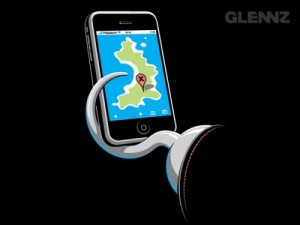Thanks to diligent journalism and investigation at the Guardian, recent breaking news on the National Security Agency’s data mining of Verizon phone records is out in the open. But can we as users do anything about it? Surveilling journalist’s telephone calls and sequestering records of Verizon subscribers sounds like a major violation of constitutional rights in the United States…Well, it’s not. What everyday users of cell phones believe to be relevant information transferred over the phone is technically protected, however raw data of the call itself – 101001 – is not. The Bush Administration’s initiation of the War on Terror and the tide of privacy legislation that came with it continues as the old war measures acts have been used to justify data collection in the wake of the Boston Marathon bombing.
From an archival standpoint, a major concern lies in the potentially lucrative contracts which the NSA and private phone companies make in order to exchange call logs for network dominance. Arguably, phone companies which record call logs have the largest collection of involuntary census data ever recorded. The collusion between the world’s largest surveillance organization (NSA/CIA) and potentially the world’s broadest data transfer company (Verizon) challenges uses of everyday communication and re-frames what counts as “relevant” information. The embedded metadata within digital call logs has use-value from individualized surveillance to big data monitoring of towns and neighborhoods. The early 21st century fears about micro-chipping and the New World Order got it half right, things have data trails. The other half revolves around accountable data collection and consent based records creation. To extrapolate from the census record, this information is very important for historians, health research, sociological data, etc.; however, the right to opt out is always present. Through privatized cell-towers and data plans, the company owns your record as well as your rights to say no to data collection. When telecommunications signs away the users right to be recorded to the NSA, profit based record creation in late capitalism has dire implications for privacy.

